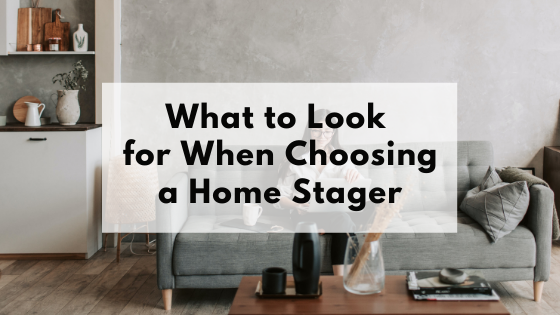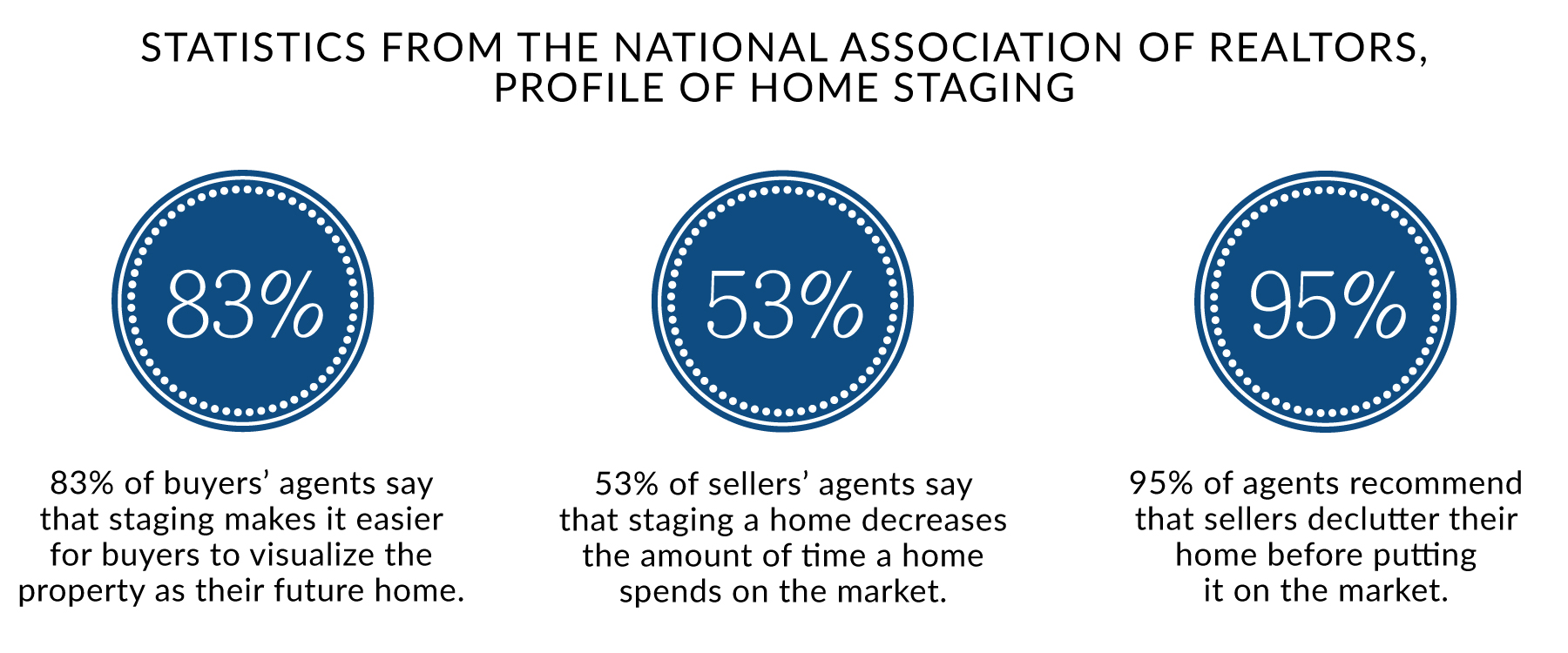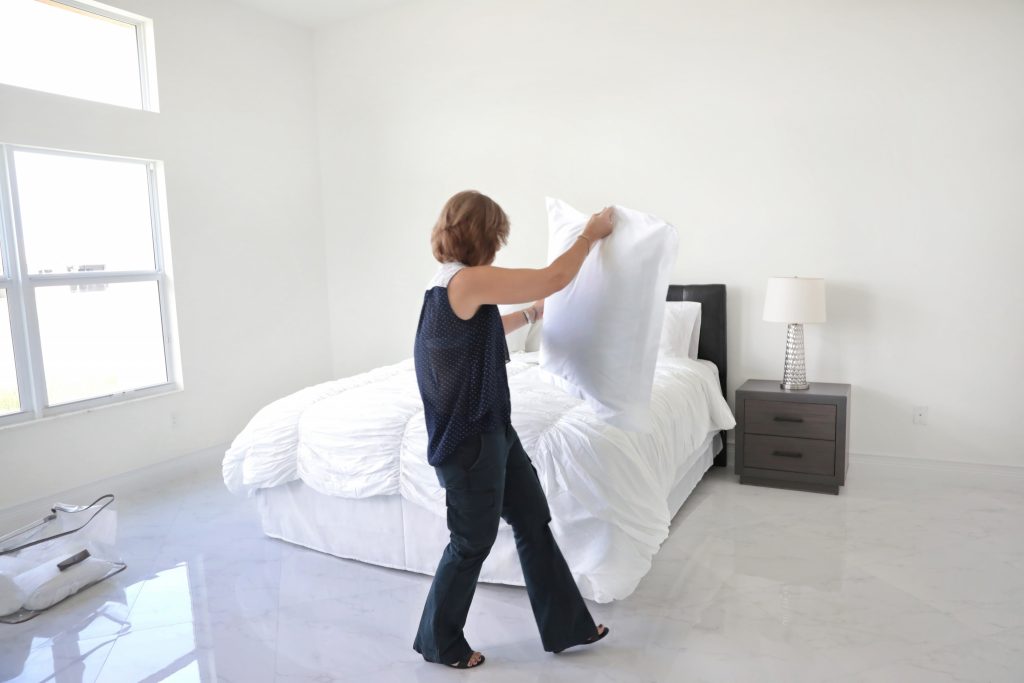
A well-staged home does more than improve a home’s ambiance. If you’ve done your research, then you know that when selling a home, well-staged spaces attract more buyers, sell homes faster and for a higher price.
Your realtor is going to be an especially vital source to recommend a good staging vendor. They will help you navigate and process the many benefits of making that investment in home staging. Moreover, the home stager your realtor recommends and that they have built a relationship with may offer more hands-on professional services and special pricing that you may not receive if you called a home staging company directly when shopping around on your own.
When looking for the right stager keep in mind that anyone can claim the title “home stager”. Be sure to check to see if they have an updated website, proper liability coverage insurance, good solid references, and are they a part of any home staging organization and display these organizations’ badges on their website? If you’ve never hired a home stager before, it is also a good idea for you to ask your friends who have and get a referral.

So let’s talk about 6 Things to Look For When Hiring a Home Stager to Sell Your Home:
Keep in mind that a professional home stager may have interior design experience or a background in the field but home staging is NOT the same as interior design as there is a difference. Home Staging involves taking out the personal and transform the property into a home that appeals to a broad range of potential buyers whereas interior design is decorating a home to meet one’s personal tastes.
#1- Qualifications
The home staging industry has trade associations that govern its ethics and offer specific training to its members. These include the Real Estate Staging Association (RESA) and the International Association of Home Staging Professionals (IAHSP).
 Courses offered by organizations like these teach valuable marketing lessons specific to home staging. They also provide some oversight and guidance for the industry. For example, RESA-certified home stagers must pass an exam, carry business insurance, and have one year’s experience as a professional home stager. Professional home stagers are trained to find ways to appeal to buyers
Courses offered by organizations like these teach valuable marketing lessons specific to home staging. They also provide some oversight and guidance for the industry. For example, RESA-certified home stagers must pass an exam, carry business insurance, and have one year’s experience as a professional home stager. Professional home stagers are trained to find ways to appeal to buyers
#2- Experience
It’s not enough to have experience decorating a home as an interior designer. As we’ve mentioned, home staging is not synonymous with home decorating.
Professional home stagers know how to make a home look great and appeal to a specific target market and should be working closely with your real estate agent to stage the home properly. Professional home stagers treat every home as something unique and recognize there are different buyers for every home. We take the bones of a home and identify characteristics to highlight. We draw the buyer’s attention to the home’s best attributes through furniture placement and style choices.

The longer a home stager has worked in the industry, the more feedback they have received from sellers, buyers, and real estate agents about appealing to the different target audiences. It improves our ability to make your home more marketable. We know from experience what does and doesn’t work for your specific targeted buyer.
#3- Insured
Be confident your professional home stager is fully insured. A professional will take every precaution to protect you and your home during the staging process. However, damage or injury can happen. A mover slips at the door, drops a sofa, and breaks his foot. Who covers his medical bills?
Protect yourself and your belongings. Your home stager needs to show you proof of insurance before you sign the contract.
#4- Portfolio

Professional home stagers curate a portfolio of their work. View it to see the work of the home stager firsthand. Go ahead and ask if all the photos on their professional website are their staged homes. It is unethical for them to show photos of staged rooms that they did not do.
While you’re looking through their portfolio, get a sense of the stager’s style. Is the home staging appealing and up to date with design trends? The style you see needs to be neutral enough to appeal to various tastes. Do you see differences in staging based on different homes? Are these homes inside your home’s price range? How professional and polished does their website in photography look? These are all signs of the home stagers professionalism and experience.
#5- Connection
Listen to your instincts. If you get a bad vibe while interviewing the home stager, that’s a sign something is off.

You want a home stager that you have confidence and trust in. You’re allowing them into your home. You also want them to respect the home and respect the emotions that go behind the selling process. At the same time, you’re trusting they have the proper style, experience, and skill to attract the right buyers and gain you more value from the home sale.
Make sure to ask these questions to a professional home stager. These will assess their qualifications and experience while helping you establish a connection with them.
#6- Delivery
Most importantly, can the home stager deliver their work within your time frame? Some companies will try to “squeeze you in” during busy times, but that results in a below-standard experience for you. If they can’t meet your timeline, they may not be the right home stager for you.
Find a professional home stager who can deliver results for your home sale. Well-done home staging benefits you when it is done right and to the highest standards of the industry. Hiring the right person will make it a positive experience for you to ideally get your home in its most marketable condition to sell.









